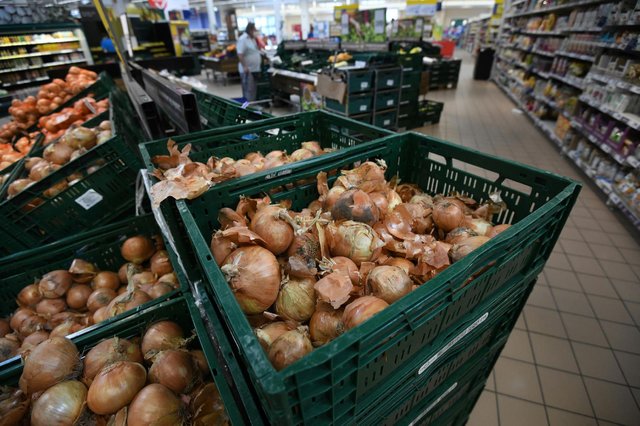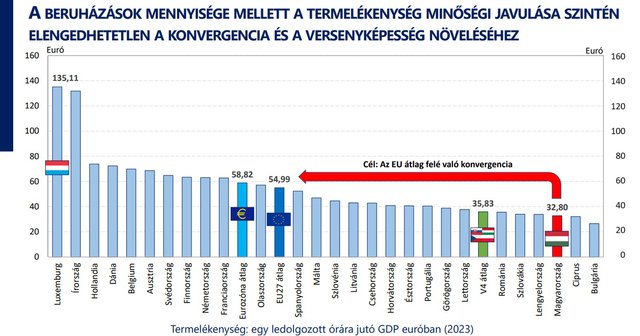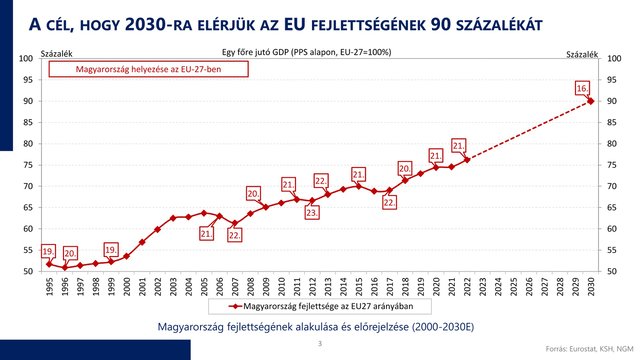Our goal is for Hungary to become one of the most competitive countries by 2030
This is how Márton Nagy's foreword starts in the National Economy Ministry's 2024-2030 competitiveness strategy document, ironically stumbling into a common trap of ambitious statements marred by details that render them somewhat nonsensical.
However, even with such mishaps, the strategy could have been exemplary, it was not.
The handling of the document by the NGM itself is somewhat peculiar. During a press conference presenting the strategy, Márton Nagy, according to a Portfolio report, mentioned a 140-page background study that would not be made public, only a condensed 20-page version to be released later. Eventually, a 29-page document emerged but was not found on the ministry's website; instead, it appeared on several county chambers and the Milk Product Council's sites, as well as in a PowerPoint presentation uploaded to the NGM's LinkedIn page. Consequently, we have uploaded both for public access.
The content, regardless of how one may wish to focus solely on substantive issues, is riddled with flaws at numerous points. Sentences such as, "The goal of the Hungarian competitiveness strategy is to present a practical action plan that increases Hungary’s competitiveness by 2030 and results in a visible and substantial improvement in productivity and competitiveness metrics," or, "The competitiveness strategy is based on four pillars: patriotism, technology, sustainability, and supply security, with a particular focus on spreading artificial intelligence in the corporate sector and establishing an advanced electromobility ecosystem," are examples of its lacking presentation.
Its data visualization effort is equally perplexing. It repeats the old promise of reaching 90 percent of the EU's development level by 2030 with a simplistic methodology: drawing a straight dashed line on a graph from the current position to the 2030 target.
Such visual simplifications, reminiscent of methods used by other Hungarian financial institutions, do little to instill confidence, especially when subsequent data falls short of these projections. The graph's ranking shows a decline in Hungary's position compared to 2009, despite improvements in productivity being essential for enhanced competitiveness.
Looking beyond formal critiques to the economic aspects of the strategy, the initial idea is promising: asking corporate leaders directly about their needs for a more competitive Hungarian economy. The survey of 1,243 companies on what they require for enhanced competitiveness results in several concrete needs, such as reduced administration, sufficient affordable green energy, skilled labor, advanced logistic services, more effective state support policies, and assistance in international expansion.
However, when it comes to translating these needs into a concrete action plan, the strategy becomes vague, filled with broad developmental goals and unexpected precise numbers, seemingly thrown together at random.
Among the strategic goals, some reveal the government's vision for the near future. One statement about ensuring education meets industry demands from elementary to tertiary levels clearly indicates a continued priority of subordinating education to industrial needs. The strategy acknowledges that technology advancement threatens one million jobs but aims to turn this into opportunities for higher-paying new roles without specific action plans.
Furthermore, the strategy calls for Hungary to become Europe's testing ground for the automotive industry and a leader in electromobility ecosystem development, which also emphasizes the need for training and research. However, it unsettlingly notes that low-cost skilled labor is a supporting factor for automotive industry growth.
Regarding the food industry, the strategy mentions revitalizing the domestic market as a key task, improving the situation of Hungarian suppliers in grocery chains, and regulating private-label products, though without detailed plans.
The strategy is even less specific about the IT and communications sector, the chemical, metal, and plastic industries, or pharmaceutical manufacturing, hinting at general support measures like patriotic procurement policies, startup ecosystem development, and supporting Hungarian suppliers in international company dealings.
For the creative industry, the strategy ambitiously dreams of establishing Hungary as the leading creative industry center in Central Europe, envisioning notable growth in fields such as fashion, furniture, and brand design by planning to build three globally recognized Hungarian brands by 2030.
Addressing the critical question of funding for these ambitious goals, the NGM suggests seeking EU funds, much like the strategy that fueled Hungary's economic growth in the 2010's, while also mentioning the potential need for targeted domestic budget resources should EU funds be delayed or insufficient.
The handling of the document by the NGM itself is somewhat peculiar. During a press conference presenting the strategy, Márton Nagy, according to a Portfolio report, mentioned a 140-page background study that would not be made public, only a condensed 20-page version to be released later. Eventually, a 29-page document emerged but was not found on the ministry's website; instead, it appeared on several county chambers and the Milk Product Council's sites, as well as in a PowerPoint presentation uploaded to the NGM's LinkedIn page. Consequently, we have uploaded both for public access.
The content, regardless of how one may wish to focus solely on substantive issues, is riddled with flaws at numerous points. Sentences such as, "The goal of the Hungarian competitiveness strategy is to present a practical action plan that increases Hungary’s competitiveness by 2030 and results in a visible and substantial improvement in productivity and competitiveness metrics," or, "The competitiveness strategy is based on four pillars: patriotism, technology, sustainability, and supply security, with a particular focus on spreading artificial intelligence in the corporate sector and establishing an advanced electromobility ecosystem," are examples of its lacking presentation.
Its data visualization effort is equally perplexing. It repeats the old promise of reaching 90 percent of the EU's development level by 2030 with a simplistic methodology: drawing a straight dashed line on a graph from the current position to the 2030 target.
Such visual simplifications, reminiscent of methods used by other Hungarian financial institutions, do little to instill confidence, especially when subsequent data falls short of these projections. The graph's ranking shows a decline in Hungary's position compared to 2009, despite improvements in productivity being essential for enhanced competitiveness.
Looking beyond formal critiques to the economic aspects of the strategy, the initial idea is promising: asking corporate leaders directly about their needs for a more competitive Hungarian economy. The survey of 1,243 companies on what they require for enhanced competitiveness results in several concrete needs, such as reduced administration, sufficient affordable green energy, skilled labor, advanced logistic services, more effective state support policies, and assistance in international expansion.
However, when it comes to translating these needs into a concrete action plan, the strategy becomes vague, filled with broad developmental goals and unexpected precise numbers, seemingly thrown together at random.
Among the strategic goals, some reveal the government's vision for the near future. One statement about ensuring education meets industry demands from elementary to tertiary levels clearly indicates a continued priority of subordinating education to industrial needs. The strategy acknowledges that technology advancement threatens one million jobs but aims to turn this into opportunities for higher-paying new roles without specific action plans.
Furthermore, the strategy calls for Hungary to become Europe's testing ground for the automotive industry and a leader in electromobility ecosystem development, which also emphasizes the need for training and research. However, it unsettlingly notes that low-cost skilled labor is a supporting factor for automotive industry growth.
Regarding the food industry, the strategy mentions revitalizing the domestic market as a key task, improving the situation of Hungarian suppliers in grocery chains, and regulating private-label products, though without detailed plans.
The strategy is even less specific about the IT and communications sector, the chemical, metal, and plastic industries, or pharmaceutical manufacturing, hinting at general support measures like patriotic procurement policies, startup ecosystem development, and supporting Hungarian suppliers in international company dealings.
For the creative industry, the strategy ambitiously dreams of establishing Hungary as the leading creative industry center in Central Europe, envisioning notable growth in fields such as fashion, furniture, and brand design by planning to build three globally recognized Hungarian brands by 2030.
Addressing the critical question of funding for these ambitious goals, the NGM suggests seeking EU funds, much like the strategy that fueled Hungary's economic growth in the 2010's, while also mentioning the potential need for targeted domestic budget resources should EU funds be delayed or insufficient.
Translation:
Translated by AI














